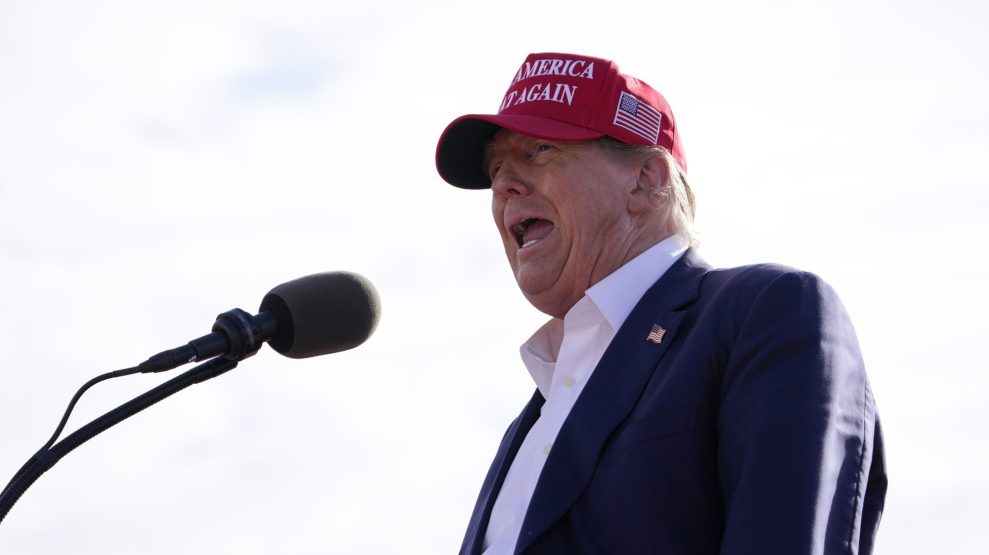
Jeff Dean/AP
Lawyers for Donald Trump asked a state appeals court to put a stay on New York Attorney General Letitia James’ right to collect roughly $450 million in damages from the former president. Trump was found liable for defrauding insurance companies and banks by giving them falsely inflated values for his properties—which meant he saved hundreds of millions on insurance policies and loan interest. In a trial last fall, James’ office successfully convinced Judge Arthur Engoron that Trump had cheated those financial institutions out of at least $355 million, and with penalties and interest the award rose to $455 million.
Trump does not have that kind of money—at least not in cash. While the value of the various properties he owns can be pegged in the billions of dollars, a recent estimate found that he likely only had around $350 million on hand. On top of that, he has also been ordered to pay more than $85 million in damages to writer E. Jean Carroll, who, a federal court found, Trump repeatedly defamed by mocking her and denying her allegations that he had sexually assaulted her. Trump is appealing all these verdicts. But as those appeals work their way through the court system, Trump will need to post bonds in excess of what he owes if he hopes to avoid having to immediately fork over the money to the plaintiffs. In the Carroll case, that’s $91 million—which he has already successfully secured from an insurance company. But in the fraud case, the figure would balloon to an astronomical to $557 million.
According to a filing Monday by Trump’s attorneys, Trump has been unable to find anyone willing to fund such an enormous bond on his behalf. According to his lawyers, Trump has queried more than 30 financial firms—including what they describe as the world’s largest insurance company—but none have been willing to front the cash. Part of the trouble, according to the filing, is that while Trump has assets that are theoretically worth more than enough to be used as collateral to secure the bond, the bond companies have little interest in being stuck with his hard assets—a Trump golf course, say—were he to ultimately default.
Instead, these companies want cash or cash equivalents—and they would charge Trump 2 percent interest, which his lawyers estimate would tack on another $18 million in costs.
This is particularly problematic for Trump because without such a bond, James would be able to collect the damages starting next week, and it’s nearly impossible to raise that kind of cash in a week. As Trump’s attorneys note, it would require a fire sale of properties he owns. With potential buyers fully aware that he is desperate for cash, he would almost certainly have to sell at a significant discount.
Trump’s attorneys argue that huge damage awards are routinely stayed so that the appeals process can play out. But that’s not always the case. In 2016, Gawker Media lost a $140 million judgement to former professional wrestler Hulk Hogan, and the Florida judge in the case refused to stay the execution of payment of damages. Unable to pay either the judgement or the $50 million bond that was required, Gawker was forced into bankruptcy. After continuing the appeals process, the bankrupted media company eventually settled with Hogan for just $36 million, but the initial inability to post a bond or have the damages stayed had already forced the media outlet to shutter.
Aside from the sheer size of the fraud award, another stumbling block may be one that has dogged Trump for some time: many lenders are simply wary of doing business with him. The appeals process for the fraud case is likely to stretch past the election, and a company that signs a deal to post his bond may find itself being owed money by the sitting president. While having a close relationship with the president could be a major asset, it could also be a potential nightmare for the lender, which could suddenly find itself in the position of trying to repossess assets from the most powerful person in the world. For large insurance companies, which often handle large bonds, working with Trump might be particularly fraught, as the industry is one of the most highly regulated. When Trump was in office, after all, he sought to use his power to punish those who angered him.

















